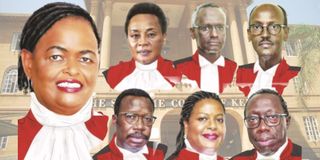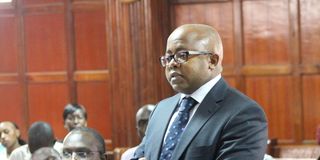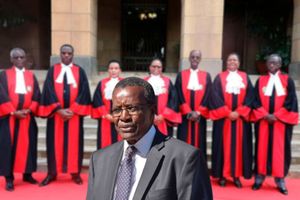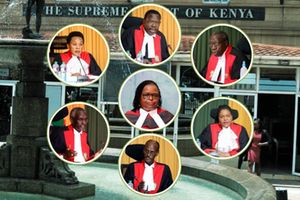
Chief Justice Martha Koome (left), Deputy Chief Justice Philomena Mwilu (top), Justices Isaac Lenaola and Ibrahim Mohamed. (Bottom row) Justices Smokin Wanjala, Njoki Ndung'u and William Ouko.
The Judicial Service Commission (JSC) has raised concerns that its official communication channels with Chief Justice Martha Koome and Supreme Court judges were recently intercepted by unknown persons, leading to the collection of crucial documents.
Through its lawyer, Issa Mansur, the Commission on Wednesday said that the mysterious interceptor also accessed confidential and privileged information related to the proposed removal of the seven Supreme Court judges from office.

Lawyer Issa Mansur.
Although Mr Mansur did not disclose the nature of the confidential information obtained, he insisted that there had been a serious infiltration of the Judiciary’s official communication and online systems.
This incident, he said, occurred before the Apex Court judges had filed their responses to the JSC regarding three petitions seeking their dismissal over alleged misconduct, misbehaviour, and incompetence.
Mr Mansur claimed that the confidential information was subsequently furnished to a Narok resident, Mr Pariken Ole Esho, who used it to build a judicial review case in defence of the Supreme Court judges.
Mr Ole Esho’s case argues that the JSC “lacks clear procedural rules consistent with constitutional principles and the rule of law for handling complaints against judges, magistrates, and other judicial officers.”
On February 18, Mr Ole Esho obtained court orders from Narok protecting the judges from facing the JSC over the ouster petitions filed by former Cabinet Secretary Raphael Tuju, and lawyers Nelson Havi and Christopher Rosana. The injunction was granted just days before the February 24 deadline set by the JSC for the judges to file their responses.
Mr Mansur made these revelations before Justice Charles Kariuki at the High Court in Narok while supporting an application by Mr Havi to have Mr Ole Esho’s case struck out or transferred to Nairobi for consolidation with seven similar cases.
Confidential communication
In challenging the case, Mr Havi told the court that Mr Ole Esho was acting as a proxy for unnamed individuals.
“In support of the judicial review application, the applicant relied on confidential communication between the JSC and the judges. This court has a duty not to consider illegally obtained evidence. The applicant relied on such evidence to move the court and obtain orders,” Mr Mansur argued.

Former LSK president Nelson Havi.
According to Mr Mansur, Mr Ole Esho has not explained how he obtained confidential communication between the JSC, the Chief Justice, and the Supreme Court judges, and subsequently used it to file a case in Narok.
“In the absence of an explanation proving that the documents were lawfully obtained, the suit should be struck out. Parties cannot infiltrate the Supreme Court, access its communications, and use them to file a case. How did he intercept communication addressed to the Chief Justice, the Deputy Chief Justice, Supreme Court judges, and the JSC? This suit should be struck out, and the applicant should be ordered to pay costs,” he submitted.
Mr Mansur, along with lawyers Mr Rosana and Mr Duncan Okatch, supported Mr Havi’s application.
The JSC lawyer further alleged that the infiltration extended to the Judiciary’s online systems, where a shadowy figure accessed and retrieved protected documents. He suggested that an insider with sophisticated access to the Judiciary Case Tracking System (CTS) was involved.
“On the extreme left, the documents bear a timestamp. The only party that can print such proceedings is the Judiciary. Even lawyers do not have access to such documents. The applicant accessed the Judiciary’s CTS, printed documents, and used them to file a case in Narok. Protected documents were used,” Mr Mansur stated.
“Without an explanation from the applicant on how he infiltrated the system, the court must direct the Judiciary’s ICT Director to clarify who accessed and printed the documents before handing them to the applicant for filing in Narok. The judicial review case should be struck out because there is no basis for hearing a case built on illegally obtained evidence,” he told the judge.
In response, Mr Ole Esho denied acting as a proxy for the judges and insisted that his case was a public interest litigation.
Public interest
“The applicant is being dismissed as a herdsman from Suswa, but he is a Kenyan citizen entitled to act in the public interest by instituting these proceedings. The argument that the case should be filed in Nairobi simply because the Supreme Court sits there is misleading,” his lawyer, Martin Ole Kamwaro, argued.

Supreme Court judges (from left) Isaac Lenaola, Dr Smokin Wanjala, Philomena Mwilu, Chief Justice Martha Koome, Mohamed Ibrahim, Njoki Ndung'u and William Ouko.
Regarding the alleged illegal access to evidence, Mr Kamwaro stated: “There is no affidavit raising these allegations. We have no control over how the CTS allocates time for matters.”
He urged the court to reject the application to strike out the case, arguing that doing so would violate his client’s right to access justice.
“We filed the case in the public interest, questioning how the JSC acted without proper procedures and attempted to throw the country into a constitutional crisis. Transferring the matter to Nairobi would set a bad precedent, as the case is already before a court of similar jurisdiction. Mr Havi’s application is frivolous,” he said.
Lawyers Havi, Rosana, and Okatch urged the court to set aside the interim orders that halted the JSC proceedings. They argued that Mr Ole Esho lacked locus standi to file the case in defence of the judges, as they had already lodged a separate case in Nairobi challenging the JSC proceedings.
“The suit has no legs to stand on. This is an abuse of the court process, as the case is neither in the public interest nor filed on behalf of the judges. They have already initiated their own legal challenge,” said Mr Rosana.
In his application, Mr Havi argued that the removal of Supreme Court judges is a constitutional process that cannot be suspended. He asserted that the temporary orders effectively halt a constitutional provision and prevent the JSC, a constitutional body, from carrying out its mandate.
He urged Justice Kariuki to adopt the reasoning in the High Court’s ruling on the impeachment of former Deputy President Rigathi Gachagua, where the court held that an ongoing constitutional process cannot be stopped or interfered with.
“If the High Court did not have the power to stop Parliament from considering a petition for the removal of the Deputy President of the Republic of Kenya, then it certainly does not have the power to prevent the JSC from considering the petition for the removal of the seven Supreme Court judges,” Mr Havi submitted.
Justice Kariuki scheduled the ruling for April 11.







